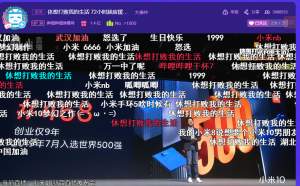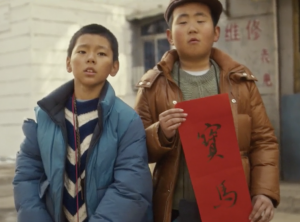
Mengniu’s holiday collaboration with “Jiang Ziya” includes a short animated film
News From China
Gift boxes are big business during the Spring Festival, and collaborations with popular IP can help brands stand out in a crowded field.
- Dove upgraded its “every year’s blessings” campaign by collaborating with the Palace Museum. In addition to an imperial-style gift box, Dove created a series of videos and illustrations with artistic motifs, and hosted pop-up shops in several cities with 3D chocolate-printing activities.
- “Jiang Ziya” (姜子牙, aka “The Legend of Deification), a sequel to last summer’s blockbuster “Ne Zha” (哪吒), will be released on January 25, and both Mengniu Dairy and Liuzhou Laojia liquor are working with the films’ domestic animation IP through short films and co-branded products.
- Daoxiangcun, a traditional Chinese pastry brand that dates back to 1895, teamed up with Tencent’s “Honor of Kings” on a five-sided gift box featuring key characters from the popular mobile game.
In another effort to boost the monetization of its platform, WeChat has started allowing public accounts to put up paywalls and charge up to RMB 208 ($30) per article. The move could also improve the quality of content, which appears to have stagnated. According to a recent report from Tencent, the average open rates for articles on WeChat was only 1.9 percent, and even top featured stories had an open rate of only 4.3 percent. Average page views for single articles have been declining over the past five years, and 15 percent of the 440,000 active public accounts in 2018 had been suspended by 2019.
Ent Group released its annual “Entertainment Index White Paper,” which predicts that the value of branded content marketing will rise to nearly RMB 130 billion this year, up 68 percent from RMB 77 billion in 2019. The report also notes that 40 percent of millennial and Gen Z consumers are willing to spend money to support brands endorsed by their favorite celebrities, and that livestreaming and social e-commerce have overtaken Weibo as the preferred platforms for content marketing.
CBNData issued a report on the commercial influence of celebrities spanning areas such as endorsements, IP collaborations and e-commerce livestreaming.
- The report notes some generational differences in celebrity preferences. Actors are more popular among millennials, while Gen Z consumers look to “idols,” who typically come out of boy bands. Among the youngest generation of idols — those born after 2000 — the stars of reality show competitions have the most pull.
- Amid broader economic uncertainty in the entertainment industry, savvy celebrities are becoming more entrepreneurial, and more are engaging with fans on e-commerce platforms, with Taobao leading the way.
- Reality shows featuring scenes from daily life are the most favored genre. Female viewers show a preference for idol competitions, while male viewers gravitate towards music and sports-related shows
- Brands are leaning towards shorter and more frequent collaborations with more celebrities instead of longer-term partnerships with a handful of stars.
Youku is set to start filming a travel reality series starring Lin Yun and Song Zuer, two of China’s most influential young actresses in matters of beauty and fashion. “Happy Girls” (嗨! 皮仙女) will emphasize laid-back lifestyle content, as its protagonists share their philosophies on life along with beauty tips, bearing comparisons to a TV show version of the social-commerce platform Xiaohongshu.
News in English
- American marketers have little understanding of how to work in China, according to new report from Lewis research. Only half of the professionals surveyed had country-specific strategies, and a third had little knowledge of how Chinese e-commerce works. Despite that, an overwhelming majority (88 percent) were “extremely confident” in their campaigns. Fortune
- Fueled by the growth of short video apps, Chinese video platforms overtook news sites in drawing advertising revenue in 2019, and are closing in on search engines’ shrinking market, according to a report by Interactive Marketing Laboratory. SCMP
- Getting famous on purpose: A look inside a Chinese influencer school where students try to learn how to go viral on short video apps such as Douyin and Kuaishou. SCMP
- Sina Weibo made a major investment in e-commerce platform Ymatou, signalling that the social media platform is seeking to deepen its ties to commerce and help influencers commercialize their activities. KrAsia
- Chinese viewers spent more time watching short videos than longer-form content in 2019, and the convergence of formats is part of the future of entertainment in the country. Abacus
- Tencent and Lego announced that they will renew and expand their partnership in China, with plans to collaborate on video, games and digital child safety over the next two years. License Global
We’ve Got China Covered





